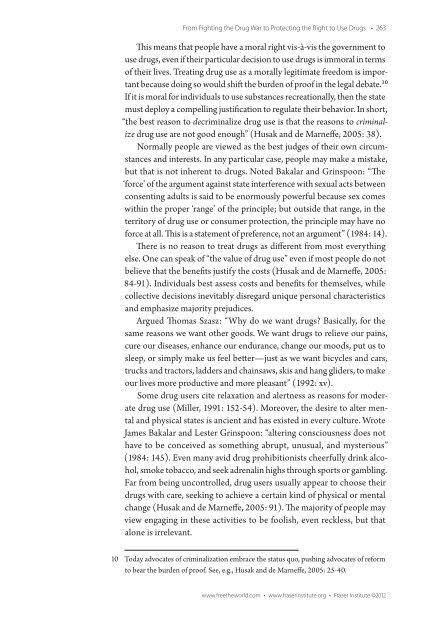Towards a Worldwide Index of Human Freedom
Towards a Worldwide Index of Human Freedom
Towards a Worldwide Index of Human Freedom
Create successful ePaper yourself
Turn your PDF publications into a flip-book with our unique Google optimized e-Paper software.
From Fighting the Drug War to Protecting the Right to Use Drugs • 263<br />
This means that people have a moral right vis-à-vis the government to<br />
use drugs, even if their particular decision to use drugs is immoral in terms<br />
<strong>of</strong> their lives. Treating drug use as a morally legitimate freedom is important<br />
because doing so would shift the burden <strong>of</strong> pro<strong>of</strong> in the legal debate.10<br />
If it is moral for individuals to use substances recreationally, then the state<br />
must deploy a compelling justification to regulate their behavior. In short,<br />
“the best reason to decriminalize drug use is that the reasons to criminalize<br />
drug use are not good enough” (Husak and de Marneffe, 2005: 38).<br />
Normally people are viewed as the best judges <strong>of</strong> their own circumstances<br />
and interests. In any particular case, people may make a mistake,<br />
but that is not inherent to drugs. Noted Bakalar and Grinspoon: “The<br />
‘force’ <strong>of</strong> the argument against state interference with sexual acts between<br />
consenting adults is said to be enormously powerful because sex comes<br />
within the proper ‘range’ <strong>of</strong> the principle; but outside that range, in the<br />
territory <strong>of</strong> drug use or consumer protection, the principle may have no<br />
force at all. This is a statement <strong>of</strong> preference, not an argument” (1984: 14).<br />
There is no reason to treat drugs as different from most everything<br />
else. One can speak <strong>of</strong> “the value <strong>of</strong> drug use” even if most people do not<br />
believe that the benefits justify the costs (Husak and de Marneffe, 2005:<br />
84-91). Individuals best assess costs and benefits for themselves, while<br />
collective decisions inevitably disregard unique personal characteristics<br />
and emphasize majority prejudices.<br />
Argued Thomas Szasz: “Why do we want drugs? Basically, for the<br />
same reasons we want other goods. We want drugs to relieve our pains,<br />
cure our diseases, enhance our endurance, change our moods, put us to<br />
sleep, or simply make us feel better—just as we want bicycles and cars,<br />
trucks and tractors, ladders and chainsaws, skis and hang gliders, to make<br />
our lives more productive and more pleasant” (1992: xv).<br />
Some drug users cite relaxation and alertness as reasons for moderate<br />
drug use (Miller, 1991: 152-54). Moreover, the desire to alter mental<br />
and physical states is ancient and has existed in every culture. Wrote<br />
James Bakalar and Lester Grinspoon: “altering consciousness does not<br />
have to be conceived as something abrupt, unusual, and mysterious”<br />
(1984: 145). Even many avid drug prohibitionists cheerfully drink alcohol,<br />
smoke tobacco, and seek adrenalin highs through sports or gambling.<br />
Far from being uncontrolled, drug users usually appear to choose their<br />
drugs with care, seeking to achieve a certain kind <strong>of</strong> physical or mental<br />
change (Husak and de Marneffe, 2005: 91). The majority <strong>of</strong> people may<br />
view engaging in these activities to be foolish, even reckless, but that<br />
alone is irrelevant.<br />
10 Today advocates <strong>of</strong> criminalization embrace the status quo, pushing advocates <strong>of</strong> reform<br />
to bear the burden <strong>of</strong> pro<strong>of</strong>. See, e.g., Husak and de Marneffe, 2005: 25-40.<br />
www.freetheworld.com • www.fraserinstitute.org • Fraser Institute ©2012


